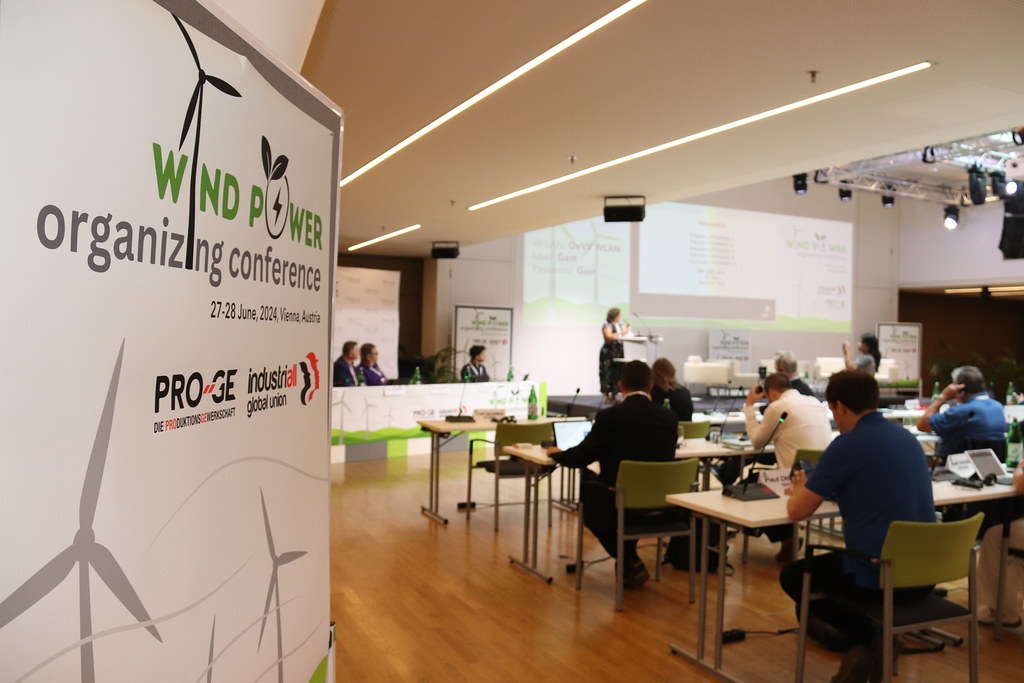3 July, 2024On 27-28 June, IndustriALL Global Union affiliates from across the globe met in Vienna to discuss an organizing campaign in the wind power sector.
The main objectives of the conference, organized by IndustriALL and Austrian affiliate PRO-GE, were to discuss the latest trends in the wind power sector and strategies to organize the workforce. Participants, both in-person and online, highlighted the situation of the renewable energy sector, particularly wind power, in their respective countries.
As countries strive towards achieving net-zero commitments, wind power is a sector that is expected to grow and attract significant government attention, including government-provided subsidies. However, the wind power sector presents both opportunities for organizing workers, as well as enormous challenges as companies in the sector continue to operate against unions.
Said Atle Høie, IndustriALL general secretary:
“There are a few big European companies that dominate in the wind power sector, and we see that these companies are not following the tradition of social dialogue. We have a huge task ahead of us in terms of organizing workers in this sector. IndustriALL has developed an organizing strategy, and we will use it to organize and democratize this sector.”
Christina Olivier, IndustriALL’assistant general secretary, presented the organizing campaign strategy approved in IndustriALL’s executive committee meeting in May. She stressed the need for robust union organizing to counterbalance the influence of multinational companies, their supply chains, and to protect the rights of workers.
“Organizing in wind power will take a cross-sectoral approach. In this conference, we have affiliates from material, base metal, energy and mechanical engineering sectors. As we develop our organizing strategy, it’s important that we involve our members, use international standards and institutions that can help in our organizing drive, and identify potential allies that can amplify our voice.”
Union representatives shared organizing strategies; the United Steel Worker’ discussed community-based organizing in the face of union busting at New Flyer, an American bus manufacturing company. In the collective bargaining negotiations in Austria’s metal industry last autumn, PRO-GE was forced to take industrial action after management refused to increase wages taking into consideration the current inflation. In the end, the union won a ten per cent wage increase, and PRO-GE also used the opportunity to organize more workers in the industry.
The big wind turbine manufacturers like Vestas, Siemens Gamesa and GE, have an anti-union approach and working conditions in this largely non-unionized sector require immediate attention. In this organizing drive, IndustriALL could target service providers, asset owners, component suppliers and turbine suppliers. Across these different categories, there are opportunities to organize workers along the entire supply chain in different parts of the world.
IndustriALL’s director for organizing and campaign, Walton Pantland, outlined different campaign strategies for the wind power sector that affiliates in different countries could pursue, like starting with project developers and work through the supply chain to the shopfloor.
Sadie Saunders from the International Federation of Transport Workers (ITF) shared their engagement with wind power project developers during their work with seafarers involved in building offshore wind farms. Participants indicated that an organizing campaign in the wind energy sector must be connected to Just Transition debates as multinational companies in the sector are benefitting from governments’ transformation-focused incentives while not providing decent jobs to workers.
Training of union cadre and solidarity between unions in the global North and global South are also fundamental to this organizing campaign, as is the gender transformative approach given the disproportionate representation of women workers in this sector. Participants also raised issues which require further discussion, like rising energy prices and energy as a public good.
Reinhold Binder, PRO-GE president and IndustriALL mechanical engineering co-chair, said in his closing remarks:
“We need to know which sectors and technologies are going to thrive in future and make sure that our union members are prepared for it. We need trainings of workers particularly more women workers. We need to sign good agreements and use all our leverage to make sure workers’ rights are protected in these sectors, especially the wind power sector.”
Following the conference, IndustriALL will continue to focus on strategic research in the sector, elaborating on opportunities and challenges, as well as further discussions with affiliates on different strategies to organize. A detailed report on strategic organizing campaign in the wind power sector will be submitted at the upcoming executive committee meeting of IndustriALL in November.










